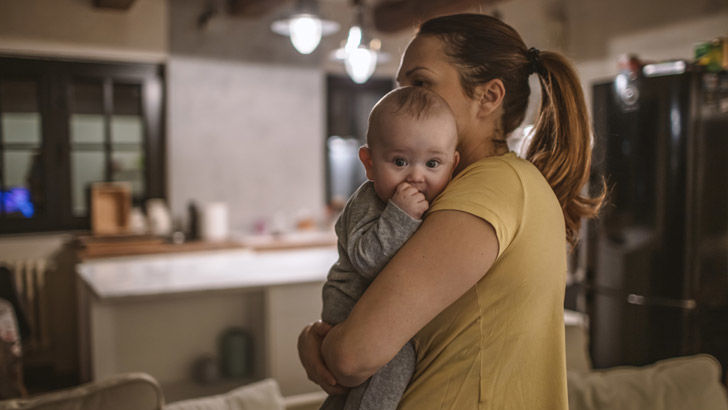Baby steps: How to prepare for the cost of having kids
Starting a family, or planning to start a family, can be a joyous and exciting time. But make no mistake, it can also be a challenging time and an emotional rollercoaster. To help smooth the journey it is important to get on top of your day-to-day finances early.
Studies have shown that at a minimum it costs more than $300,000 for two parents to raise two children up to the age of 17. And if you plan ahead these costs won't be as daunting in the longer term.
When couples or singles approach a financial adviser about starting a family, three common questions arise: Can we/I afford to have a baby? What benefits are we/am I entitled to? And what does our/my financial future look like?
Renee Tang, a Newcastle-based financial planner at First State Super, says there's not a common answer to these questions as every person's situation is unique. However, a good financial planner will not only answer these questions, but dig deeper to better understand where you want to be in the long term.
Can you afford it?
One of the first considerations when starting a family is the potential loss of household income and how to manage it. Two common scenarios that need to be addressed are: what if the primary carer loses some or all of their income and how long do the parents plan to be out of work?
James Gerrard, director and financial planner at financialadvisor.com.au, says a common scenario is a couple who are saving $2000-$3000 a month on two incomes before having a child. If one income is lost for 12 months, it's likely those monthly savings will fall - even with government support.
"If you're going backwards $2000 per month in cash flow, then you'll need to save at least $24,000 before the baby arrives - otherwise you're going to be eating into your savings to get through that [12-month] period," says Gerrard.
The Sydney-based adviser says savings will also be important for when one partner re-enters the workforce as they'll often be working part time. This also means household income is down before the child arrives and now there's the increased daily expense of looking after a little one.
Tang says parents need to consider what financial commitments they will have before and after the child is born, such as doctors' and hospital bills, ultrasounds and other tests, birthing classes and child care; as well as mortgage or car repayments. She says it is common for couples to buy a house and have a child in tandem and they'll need to think about what this means for their budget.
"Think whether your current accommodation is suitable or even whether your car is suitable," says Tang. "If a child is to come along, maybe the two-seater convertible is no longer
an option."
Tania Tonkin, director and financial planner at dmca advisory (part of the IOOF group), says that the number one thing to do if
you've bought a house and have a child on the way is not to overstretch yourself with mortgage repayments.
"Often fixing your home loan rate for a set period of time can be a good idea to help out because it confirms what your mortgage repayments are going to be," she says.
Although higher interest rates are unlikely for some time, Tonkin says if they were to be increased, your fixed rate would provide some comfort.
The Adelaide-based planner also says three to six months' worth of income is often a good savings buffer as 12 months "can be a fairly hefty sum to set aside". She suggests holding this buffer in your mortgage offset account as it's "going to give you some benefit in the sense that it's reducing the payment on your home loan but it's easily accessible as well".
Tonkin says to help with budgeting, utility and insurance costs can be brought down to monthly payments instead of the big quarterly or annual bills.
"Identify what your living expenses are, then work out what you need to live on and then, where possible, consider paying off bills monthly and in smaller chunks so you're not hit with big lumps at once."
Tang says once you come to terms with your budget or spending plan, then a financial adviser can work through your debt repayment plan - for example, how much do you want to put towards the mortgage and how will this impact your long-term goals?
"We could also work on your saving capacity, and whether you wanted to tailor it for your children's education plan or how much can you put aside for your own wealth accumulation," she says.

Protect the future
Expectant parents will often ask advisers about how to protect their and the baby's financial future should one or both of them die or become sick or permanently injured.
At this point it's worth completing a review of your life insurance policy. Gerrard says while it's fine to have a policy within your super fund, you should check that you have the right features and whether the policy is powerful enough to meet your needs, especially with a child in the family.
For example, total and permanent disability (TPD) cover is one area that differs between policies held inside or outside your superannuation. TPD insurance inside super will pay a lump sum if you can't do any job for which you are skilled. A policy outside super will pay a lump sum for your own job, not any job - and because the terms are more specific (often meaning a payout is easier to achieve) it can be a more expensive option.
Gerrard recommends people opt for levelled premiums with their life policy. If you were to lock in, say, $1 million worth of insurance cover when you turn 35, the premium might be $1000 a year and it stays at that rate until the policy is cancelled at 65.
"The default cover with super funds might start at $1000 per year when you're 35, but it might keep going up every year (stepped premiums) and 10 years later the premium might be $3000-$4000. The younger you are, the cheaper it is to lock in that levelled premium structure," he says.
Tang says it's also important to keep affordability in mind when it comes to life insurance. If a couple are living off one income, they may want to think about adjusting their life policy to suit.
Tonkin says mums and dads often have adequate life insurance, but when a child comes along the dollar amount, in terms of cover, can increase significantly.
She says that during the conversation about starting a family, often a needs analysis will be completed for life insurance. It asks what your future expenditure requirements might be if your spouse or partner is no longer around. And it then leads to what sum of money should be insured for the parents.

Effort for education
A common issue for parents starting a family is whether they should invest now for future education. If you can afford to do so, all three financial advisers suggest putting some money away for education - and there are several ways to do it.
You can open a term deposit account where money is readily accessible, secure and low risk but collecting extremely low interest. It's a similar scenario if you were to put the money in a mortgage offset account.
Alternatively, you might consider investing in a managed fund, an investment bond or an education bond. For the two latter options, investment returns are taxed at 30% with no capital gains tax (CGT) discount and this is paid within the bond by the provider. If you hold the money in an investment bond for more than 10 years, then withdrawals after that are tax free.
Tonkin says that the main benefit of an investment bond is that money is accessible at all times, whereas with an education bond you have to determine that withdrawals are purely for education purposes. There are other features and tax implications with these investment vehicles, so it is best to speak to your financial adviser.
There are other ways to invest for your children, too. Gerrard says for each of his own children he has been buying one ounce of gold every year until they turn 18 and will then gift it to them.

Multiple children in the mix
If you have a child or children from a previous relationship, this should also factor in your planning to start a family with a new partner. A top priority would be to make sure you can continue to afford to pay child support as well as looking after the new child.
Tang says while the cost is important, you will need to think about the time and effort you need to cater for children from a previous partner too. The number of days each week the child will spend with each parent must be determined, especially if there's a newborn involved.
Gerrard says one of the most important conversations is to also work out what the asset split will look like if the partner with children from another relationship dies. He says it's better to sort this sooner rather than later, otherwise it will be a mess for all parties involved.
He's seen clients have screaming matches about what assets should go to whom. He tells of a case where a husband and wife were married for 15 years and had one child together aged 10. The husband had a couple of boys from a previous relationship (who were now adults) and he wanted them to be looked after in the will. However, the current wife felt differently, wanting assets to solely go to the couple's daughter.
Tonkin says parents need to think about who the guardians will be for their children if both parents die, or perhaps set up a testamentary trust that provides for the children if one partner dies. This helps if you're thinking an ex-spouse is likely to try to access your assets.
She says the education costs of children from a previous relationship are also a big talking point. She's seen examples where one parent will decide to stop paying private school fees, meaning there's a significant impact on the other parent who may be able to afford to continue with private education.
A good solution is a binding financial agreement that sets out the terms for financial support. These don't have to be drawn up by a lawyer; it's something people can do together with a witness present. And it becomes important in case something does go off track.
Get stories like this in our newsletters.



